With a new intuitive understanding of children’s rights.
“You have no right to hit your wife!” systematically claims Arndt Soret, chairperson and founder of Humanium when coaching groups in Rwanda. “Violence and guilt will keep on being passed on like hot potatoes from generation to generation since the 1994 genocide, if we don’t do anything about it” he further asserts.
But what can we do about it? How can a young father whose parents were murdered can adopt a violence free behaviour? How can we teach a young mother to respect her daughter when she has experienced such brutal contempt herself?
Humanium has developed a new approach to answer these questions in a professional & therapeutic environment. Using intuition and self-awareness, participants have the opportunity to break the circle of violence.
Self-awareness against violence

Arndt and the Humanium team combine coaching and leadership with an understanding of trauma therapy and psychology together, to make children’s rights intuitively tangible, not simply intellectually communicated. For that matter, no other children’s rights NGO combines these disciplines like we do. The new technique allows participants to remember their feelings and to share them. They learn to understand and distinguish their own and communal emotional words, and to what extent they are influenced by childhood memories. They understand that in the here and now, the circle of violence, experienced in childhood is still in them; such as after their father’s frustration turned to violence, because he was not being able to feed his family, and the sense of hopelessness that this gave women. The victims of this toxic mix of violence and hopelessness are almost always the children. And this is how the circle of violence carries on. Right until the group becomes aware of it, and builds resilience, mindfulness, joy and compassion for its surroundings.
We reach people through local leaders

The workshops in Rwanda aim at groups but rely on individuals. It is built upon their reality and world of experience as this is what alters their perceptions and influences their behaviour. Under the motto “Everyone is a leader”, Humanium attempts to form local leaders. Indeed, we believe their awareness and strength attracts others and creates a motivational force, which is passed on to others. Since they work with their community, mostly children, there is a snowball effect, drawing more and more people in. People feel free of violence and are able to self-realise children’s rights, not sometime in the future – NOW!
To ensure it is experienced daily, repetition is important. Therefore, the workshops take place annually with the same participants, over a three to four-year cycle. Arndt explains the necessity of continuity: “It is only in this way that numerous people can permanently achieve peaceful and joyous change.”
It is important, take it seriously!

“People really want to talk and express their feelings, quite differently from how we do it here in the West,” explains Arndt, when describing the story of a village mayor who attended a morning workshop. Through his pure enthusiasm for the experience, he took the took the hours-long dusty roads to explain to other participants that what goes on in the workshops is important and that they should take it seriously.
What exactly happens in these group sessions?

Humanium puts the groups together with their local partner AVSI (Associazione Volontari per il Servizio Internazionale). Groups of up to 25 participants are brought together for up to four hours to feel, not to think. AVSI knows the participants well, as their social workers visit the individuals in their families on weekly basis. Since 2014, AVSI has partnered with Humanium and, as a local children’s aid organization, is well acquainted with local conditions, people and history.
The aim of working with the groups is to end domestic violence and teach about human and children’s rights. Exactly how collaboration with the groups works, depends on the groups themselves and how they are at that moment in time: “We encourage everyone to take part, and speak out on what would otherwise be left unsaid. That gives every group a dynamic that we can never predict,” explains Arndt. He calls the ability to adjust to the moment, the participant and what they need, “Dancing in the moment”. In this moment, the most important role of the trained coaches from Humanium and AVSI is to hold the room and to provide security. This emboldens the participants, helping them to share their experiences and develop compassion. Both are prerequisites for openness and for trust in relationships between each other. For many of the participants, they have the possibility to develop this for the first time in their lives. Also, as every workshop is different, we can identify five steps that belong to the Humanium approach:
- Bringing feelings to light: The participant must remember a childhood emotion and articulate it in this safe space, without becoming fearful or causing distress.
- Sharing feelings: With coaches’ assistance participants can share their feelings with the group and understand the impact it has on their life, their family and environment.
- Role playing: Role playing is the core of every group session. The coaches switch roles – women play men and men feel what it is like to be the women. Here something astonishing happens. Through switching perspectives, the participants are able to understand what it is like to be in another’s shoes for the first time. Arndt reports, that the participants, through this role playing, understand for the first time, how their wives feel when they hit them. This brings about a change in behaviour that many did not expect.
- Exchange: Success for this roll swapping exercise means lasting change in the awareness of participants. In the intensive conversational phase that follows the roll playing, participants share their experiences. Attentive listening strengthens the relationship between the participants. It helps developing a more profound insight into the social relationships that stands behind the problems of the adults, their families and villages.
- Anchorage: The target of changing relationships intensifies during the integration process. With help from established approaches such as ‘Echosharing’, their feelings and newly developed awareness is shared with a partner through active listening. This step is very important, in order to consolidate the experience and convert the new relationship knowledge.

On the subject of new relationship knowledge, Arndt sometimes hear that, this is all well and good but that it does not change the tough reality of life in Rwanda, away from the fashionable capital of Kigali. He claims: “I hear that said occasionally, but this they grasp it, when they experience it regularly and visit the participants again”. The regional staff from AVSI also confirm that long-term work generates violence-free behaviour and interaction, and that this process is contagious. Documented cases of domestic violence in areas that have already been visited have dramatically fallen.
Along with the annual visit, there are regular ‘friends of the family’ meetings, where participants exchange ideas. “Just the fact that there are groups where they can be listened to and understood where there was once only silence and violence, brings participants encouragement and happiness”, states Arndt. “We are going to further work with a group of young mothers, which is particularly exciting”, he says. He points out that working with the lowest division of the village hierarchy is difficult at first but always turns out to be the most enriching and lasting experiences.
This Humanium programme has been supported by the AIR FRANCE foundation. It reached 82,000 children through their families and villages but we always need more help to achieve our goals. We love when you get enthusiastic about our programmes so you can support Humanium by making a donation (https://www.humanium.org/en/donation/), becoming a partner (https://www.humanium.org/en/child-sponsorship/) or by volunteering https://www.humanium.org/en/participate/internships/). Many thanks!
Would you like to find out more about our work? Contact us at: contact@humanium.org

Written by Andrea Goffart
Translated by Jacob Davies
Proofread by Charlotte Madrangeas


